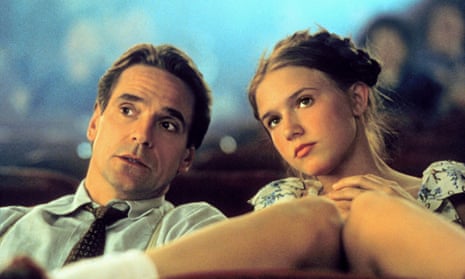To what extent are literary villains changed by history? It’s a question that is never more sharply posed than by that most slippery of fictional monsters, Humbert Humbert. I first encountered him by torchlight when I was not much older than Lolita. In my 1970s boarding school, he shared a space beneath the mattress with John Cleland’s Fanny Hill – two “classic” novels that connected with adolescent fantasy in ways that couldn’t be exposed to the light of day, even though both books had been purloined from perfectly respectable adult bookshelves.
For a 1970s teenager, Lolita was glamorously erotic. I know I wasn’t alone in fantasising about what it might be like to be a gum-popping nymphet, whisked away on a road trip by a handsome literary sophisticate. “I have all the characteristics which, according to writers on the sex interests of children, start the responses stirring in a little girl: clean-cut jaw, muscular hand, deep sonorous voice, broad shoulder,” Humbert tells us. “Moreover, I am said to resemble some crooner or actor chap on whom Lo has a crush.”
Which of us didn’t have a crush on some crooner or actor chap? Humbert’s particular genius is to commandeer such fantasies and seduce us into accepting his enactment of them, no matter that his story is framed as the confession of an imprisoned paedophile. Lolita might cry into her pillow every night, but during the day she is what, in the heyday of teen stars such as Nastassja Kinski and Tatum O’Neill, many teenage girls dreamed of being (and many men doubtless dreamed of possessing): “maidens who, to certain bewitched travellers, twice or many times older than they, reveal their true nature which is not human, but nymphic (that is demoniac)”.
If my own relationship with Lolita is rooted in the time at which I first read it, what of its very first readers? By the time it arrived in the US it had been around for three years, acquiring the notoriety of being banned in both the UK and France. Reviewing it in the New York Times in 1958, Elizabeth Janeway wrote that, at first, “I thought it was one of the funniest books I’d ever come on … the second time I read it … I thought it was one of the saddest.” Nabokov, she says, was “slyly exploiting the American emphasis on the attraction of youth and the importance devoted to the ‘teen-ager’ in order to promote an unconscious identification with Humbert’s agonies”. She concludes: “I can only say that Humbert’s fate seems to me classically tragic, a most perfectly realised expression of the moral truth that Shakespeare summed up in the sonnet that begins, “the Expense of spirit in a waste of shame/ is lust in action.” It’s a reading that exonerates Humbert of the consequences of his actions – perhaps a sign of an era that hadn’t faced the horrors of systematic child abuse.

In order to be tragic, Humbert needs to convince us that he is a character of stature, not just a sordid abuser who takes a young girl on a sex tour of seedy American motels. One trick he plays is to distance himself from evil by evoking a “beast”, Quilty, who abducts Lolita from hospital and abuses her so badly that Humbert is driven to murder him, in a parodic version of an honour killing. Nabokov packed the novel with jibes about psychiatrists, beadily anticipating interpretations such as the suggestion that Quilty is Humbert’s evil doppelganger.
Rereading the novel in 2014, I found that the scariest beast isn’t Quilty, the perverted Jimmy Savile figure, but the evasive Humbert, who is intoxicated by his own language and confirmed in his smugness by the chain of lucky coincidences in which Nabokov enfolds him. Just as Lolita’s mother is about to expose Humbert and abort his whole erotic mission, she is accidentally run over by a car; just as he is about to despair of ever finding Lolita again, she reappears as a married woman. It confirms his conviction that “emphatically, no killers are we. Poets never kill.”
But if his language insulates Humbert, it also condemns him. The key to his monstrosity lies in his very first sexual encounter with Lolita, when he masturbates with her sitting innocently in his lap. “With the deep hot sweetness thus established and well on its way to the ultimate convulsion, I felt I could slow down in order to prolong the glow,” he says. “Lolita had been safely solipsised.” The point about solipsism is that it is a condition of the individual. You can’t solipsise someone else. The verb didn’t exist before Humbert invented it in order to have his wicked way with a child whose own agency, and identity, are erased by his actions. “What I had madly possessed was not she, but my own creation … encasing her; floating between me and her, and having no will, no consciousness – indeed no life of her own.”
In his epilogue, Nabokov insisted that Lolita has no moral. But the corruption of that single word – “solipsise” – epitomises what the novel means to me now, and why it is still worth reading. It reveals what is fundamentally abusive about abuse: not just the act, but the absolute denial of another person’s right to autonomous existence.




Comments (…)
Sign in or create your Guardian account to join the discussion